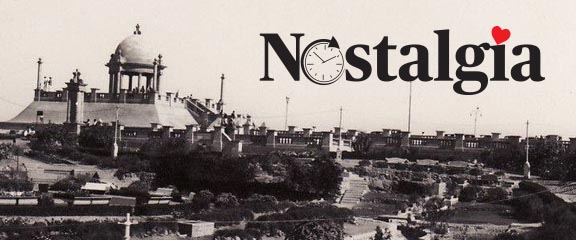The first part of this series of articles on Karachi of the bygone days appeared in the December 2021 issue of Narratives: (https://narratives.com.pk/nostalgia/memories-of-another-day/)
Seeing the lifestyle and habits of my grandchildren and students alike, I realise that the degree to which the world has changed is more radical than ever before. We baby boomers, like all the generations that came before us, lived in a far simpler time. We were forced to be self-reliant in terms of entertainment and keeping busy, and thus were more commonly pushed to engage our imaginations in different ways. Looking back, I appreciate the present, am excited for the future, but am thoroughly grateful for what we had.
The 60s was a time when ‘mass media,’ referred to just the radio, newspapers, magazines and cinema at that time, was not that obsessively dominating as it has become nowadays. From our days in Australia and then back to Karachi, reading was a favourite pastime for us three girls, as it was for many in Pakistan as well as those ‘Down Under.’ Books were an instant gateway to distraction and imagination, and we could not get enough of them. In Karachi, we borrowed from our school libraries, the British Council and bought books and exchanged them with our friends and cousins, creating complex categorised networks where it quickly became known who would have what type of books and who to connect with for the next sequel of a beloved series. Whether comic or novel, fantasy or adventure, everyone connected to the magic spun through storytelling.
Coming back to Karachi as young ladies, books and the radio became far more ever present in our daily lives, as the days of jumping on our bikes and seeking adventures down lanes or in forests had come to an end. However, we never felt isolated nor restricted as those adventures just took on a new form through the written word.
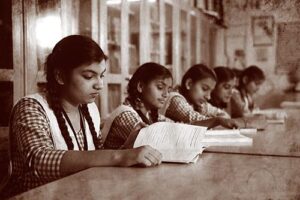
We could not wait to come home from school so that we could get to our ultimate treasure trove, The Ideal Library on Tariq Road. The ability to borrow books, magazines and comics for a nominal sum allowed us to maximise the number and type of comics and books we could then spend the evening powering through. Our daily ritual of visiting the library, after afternoon tea, was one of the highlights of the day as it was for many of us who lived in and around PECHS.
We would gather in groups closer to our school, St Joseph’s Convent School for Girls, and together visit Anthony Coutinho & Co., the bookshop that was just across the road. Our main ‘haunt’ was in fact at our school gate, where all the girls would gather waiting for our rides home. Looking back, it is a strange ‘East meets West’ scene, where instead of a soda pop shop setting, we were surrounded by various kulfi, chaat, and churan wallah’s carts all within 5 meters of the gates themselves. A few hundred girls, the various hawkers, and the guards, all waiting together, but we quickly got engrossed in the plot of the newest sequel of a book or movie that had come out. The sense of freedom that came from the end of day vs. recess or lunch time, totally nuanced our stories. Though there were those that gossiped, there were many of us deeply involved in the plot twists, mysteries, or character development which was more an ode to our simpler times. The art of storytelling was alive and well and those of us who could build the imagery and relay the excitement of the books, were the focus of attention and sought after as friends. It was up to us storytellers to build within minutes the sense of awe and magic that an author would be able to create in chapters; the goal of being just as creative in order to maximize one’s audience and ‘popularity and power.’
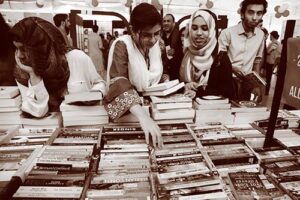
Today, the Pakistani and Indian channels have brilliant dramas and soaps whose daily or weekly cliff hangers become fodder for the masses. Likewise for us, it was primarily our novel sequels, but sometimes what was coming on the latest radio or TV show gave us material to then weave magic. All of this was made possible by our individual trips to the various bookstores and libraries, and then the complex trading that followed.
Occasionally, our father would take us to The American Book Store on Elphinstone Street. It seemed, in general, that the girls we went to school with primarily focused on English books. Depending on our age, we read various Enid Blyton series (what a prolific author she was!) including The Adventures of Noddy and The Famous Five, and series by other authors that included Trixie Blendon, Billie Bunter, Anne of Green Gables, Jeeves and Wooster, Pollyanna, murder mysteries with the likes of Agatha Christie’s Poirot and Miss Marple series or Doyle’s Sherlock Holmes, and Westerns written by Zane Gray…. the list is endless. We also enjoyed perusing a wide range of comics like Little Lulu, Archie, Superman, The Phantom etc.
Some of us focused on Urdu books and comics, while there were many who had the advantage of both languages and thus twice the material to choose from. We, unfortunately, were late to learn Urdu, and being that there was already so much scope within English itself, our interests rarely travelled to those other jewels; something that I have always been regretful of and have tried to make up for. However, at the time, we were able to overcome this limitation through the beloved Radio Pakistan. Radio, however, is to be reminisced about another day.
Regardless of age, the love affair with books resulted in a whole generation who were knowledgeable, wrote and spoke well and were masters at communication. As we grew older, and our English Literature classes delved further into poetry, plays, and novels, so did our understanding and desire for theatre, elocution and public speaking. It seems almost foreign now, given today’s medium of PowerPoint or Prezi or even TikTok videos, but for us memorising pages upon pages of poetry or a speech to present in class with full emotion and grandeur was the norm. My sisters and I would individually practice at home and then do run-throughs at night, before performing at school. To this day, even when I read aloud a story or poem sent to me via social media, that inherent need for ‘dramatic flair’ always kicks in (sometimes to the annoyance of my children). Though they themselves participated in forensics, the soul’s deep love for emotive reading is not present, as it still is within us.
It is almost comical though, that even though we took literature and poetry so seriously, a comic could just as easily grab our attention and have us enthralled. The joy of our ritual jaunts to the bookstores and libraries, resonated within us when we heard the call of the comic wallah, ‘Comic wallah, English comic wallah.’ While some of us gravitated towards reading Archie, describing the boy next door, suburban American ideal, others were fascinated by Superman and other super heroes present in the DC and Marvel universes. Looking back, it seems that comics and movies were our window into American life, whereas the books we read, gave us similar insight to life in British Boarding schools and villages.
Our world was further expanded through magazines. Of course, we went back to the British and American classics through Schoolgirl, June and Princess , or Calling All Girls. Our mums and aunts would read Women’s Own and Women’s Day, full of beautiful picturesque English gardens and narratives relating to the British Royals. Three magazines that opened the door to the rest of the world were the Times magazine, Reader’s Digest and the National Geographic. I remember always looking forward to their newest editions, but then there was a certain reverence with which one would turn the pages. The written word of those articles, whether a political or economic comparison from the Times or an in depth look at the lives of indigenous people on a far off island in National Geographic, always seemed to have a greater, almost sacred meaning. The Reader’s Digest was our monthly collection of jokes and well-written meaningful articles celebrating the beauty of human relationships and values. Our trip back to Pakistan opened my eyes to the world and what was beyond the realm of our gardens. Books provided creative worlds in which we would get lost; but it was these magazines that gave a retrospect of God’s world and creation. Though obviously not religious books, it always was with more serious intent, almost reverence, that those pages would be turned and the information be absorbed. It was these magazines that allowed us to be able to paint pictures in our minds and give references and parameters to the world that we could see in our minds.
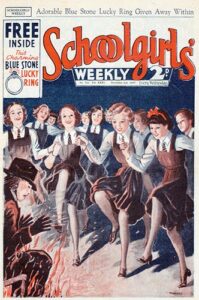
The art of reading was deeply embedded in our generation and the generations before us. It was this love for books that moulded us into becoming great communicators and nurtured our imaginations so that we were able to see beyond the obvious and come up with thousands of inventions that have flooded the world in the last 50 years. Having taught for 40 years, if there is one piece of advice I can pass onto new parents and grandparents, it is that you should encourage all children to read. Read to them till they learn to read themselves and instil in them the love of reading. The brightest of my students, the ones who stood out and did well at school were all prolific readers. When I speak to them today, as successful leaders across the world varying from political, corporate, and social fields, they all relate to how reading continuously helps them in their careers and their lives. Beyond success however, reading, whether it be a comic or novel, encourages each mind to find their escape and bliss. We were all, and shall forever be in our hearts those children that secretly continued our adventures through our books and our flashlights when all were supposed to sleep in our beds.
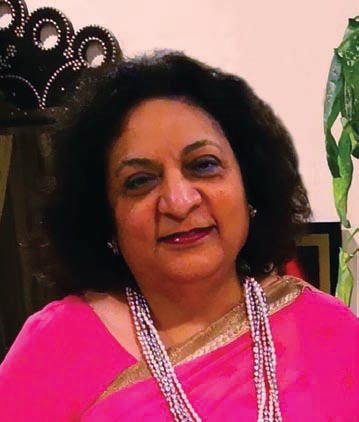
The writer is a Kuwait-based Pakistani educationist, who has passed on her love for science to generations of youth and inspired many to take up the study of environmental science.


